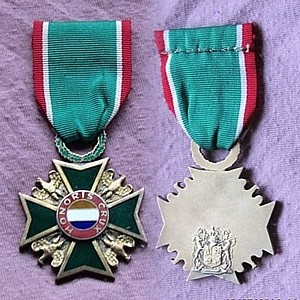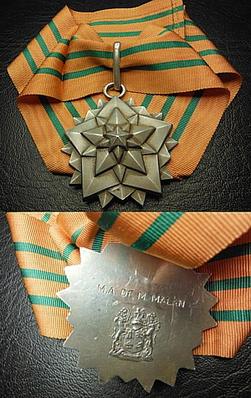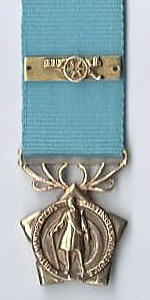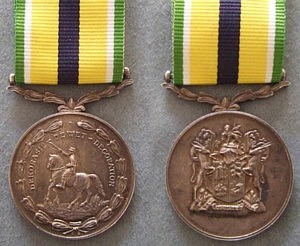
The Honoris Crux of 1952, post-nominal letters HC, is a military decoration for bravery which was instituted by the Union of South Africa in 1952. It was in use from 1952 to 1975 and was awarded to members of the South African Defence Force for gallantry in action against the enemy in the field. It was discontinued on 1 July 1975, when it was replaced by a new set of four Honoris Crux decorations, in four classes.

The Louw Wepener Decoration, post-nominal letters LWD, is a military decoration for bravery which was instituted by the Union of South Africa in 1952. It was awarded to members of the South African Defence Force for acts of the most conspicuous courage or greatest heroism. The decoration was discontinued on 1 July 1975, when a new set of decorations and medals was instituted.

The Star of South Africa, post-nominal letters SSA, is a military decoration for merit which was instituted by the Union of South Africa from 1952 to 1975. It was awarded to general and flag officers of the South African Defence Force for exceptionally meritorious service. The Star of South Africa was discontinued on 1 July 1975, when a new set of orders, decorations and medals was instituted.

The Van Riebeeck Decoration, post-nominal letters DVR, is a South African military decoration for bravery which was instituted by the Union of South Africa in 1952. It was awarded to officers for distinguished service in the field.

The Van Riebeeck Medal, post-nominal letters VRM, is a military decoration for bravery which was instituted by the Union of South Africa in 1952. It was awarded to other ranks for distinguished service in the field.

The Louw Wepener Medal, post-nominal letters LWM, is a South African military decoration for bravery which was instituted by the Republic of South Africa on 20 October 1967. It was awarded to members of the South African Defence Force for courageous or heroic deeds in saving lives. The Louw Wepener Medal was discontinued on 1 July 1975, when a new set of decorations and medals was instituted.

The Korea Medal is a military campaign medal which was instituted by the Union of South Africa in 1953. It was awarded to volunteers of the Union Defence Forces for service in Korea during the 1950-1953 Korean War.

The Permanent Force Good Service Medal was instituted by the Republic of South Africa in 1961, when South Africa became a republic, to replace the Union Medal. It was awarded to Permanent Force members of the South African Defence Force for eighteen years of service and good conduct.

The John Chard Decoration, post-nominal letters JCD, was a military long service decoration which was instituted by the Union of South Africa on 6 April 1952. It was awarded to members of the Citizen Force of the South African Defence Force for twenty years of efficient service and good conduct. Clasps could be awarded after thirty and forty years service respectively.

The De Wet Decoration, post-nominal letters DWD, is a military long service decoration which was instituted by the Republic of South Africa in 1965. It could be awarded to members of the Commandos, the rural civil defence component of the South African Defence Force, for twenty years of efficient service and good conduct. The decoration was initially reserved for officers, but it was made available to all ranks in 1986. A clasp could be awarded after thirty years service.

The Military Merit Medal, post-nominal letters MMM, is a military decoration which was instituted in the Republic of South Africa on 9 October 1974 as the Chief of the Defence Force's Commendation Medal. It could be awarded to all ranks of the South African Defence Force for service of a high order.

The Southern Cross Decoration, post-nominal letters SD, is a South African military decoration for merit which was instituted by the Republic on 1 July 1975. It was awarded to officers of the South African Defence Force for outstanding service of the highest order and utmost devotion to duty.

The Pro Merito Decoration, post-nominal letters PMD, is a military decoration for merit which was instituted by the Republic of South Africa on 1 July 1975. It was awarded to other ranks of the South African Defence Force for outstanding service of the highest order and utmost devotion to duty.

The General Service Medal is a military campaign medal which was instituted by the Republic of South Africa in 1987. It could be awarded to members of the South African Defence Force from 1 January 1983, for operational service inside South Africa in the prevention or suppression of terrorism or internal disorder, or the preservation of life, health or property, or the maintenance of essential services and law and order, or crime prevention.

The National Cadet Bisley Grand Champion Medal is a military medal which was instituted by the Republic of South Africa in 1987. Originally named the Cadet Corps Grand Champion Shot Medal, it was awarded to the Grand Champion of the annual National Cadet Bisley of the School Cadet Corps.

The Pro Merito Medal of 1975, post-nominal letters PMM, is a military decoration which was instituted by the Republic of South Africa on 1 July 1975. It was awarded to other ranks of the South African Defence Force for exceptionally meritorious service and particular devotion to duty, and was the non-commissioned officers' version of the Southern Cross Medal of 1975 (SM).

The Medal for Distinguished Conduct and Loyal Service is a South African military medal which was instituted by the Republic in 1987. It was awarded to members of the South African Defence Force for forty years of loyal service and distinguished conduct.

The De Wet Medal is a military long service medal which was instituted by the Republic of South Africa in 1987. It was awarded to members of the Commandos, the rural defence component of the South African Defence Force, for ten years of efficient service and good conduct.

The Union Medal was instituted by the Union of South Africa in 1952. It was awarded to Permanent Force members of the South African Defence Force for eighteen years of service and good conduct.

The SADF Champion Shot Medal is a military medal which was instituted by the Republic of South Africa in 1975. It was awarded to the champion shots of the annual South African Defence Force Shooting Championships in the categories of full-bore, small-bore, service shooting and pistol. The medal could be won multiple times, with each subsequent award indicated by a bar.




















